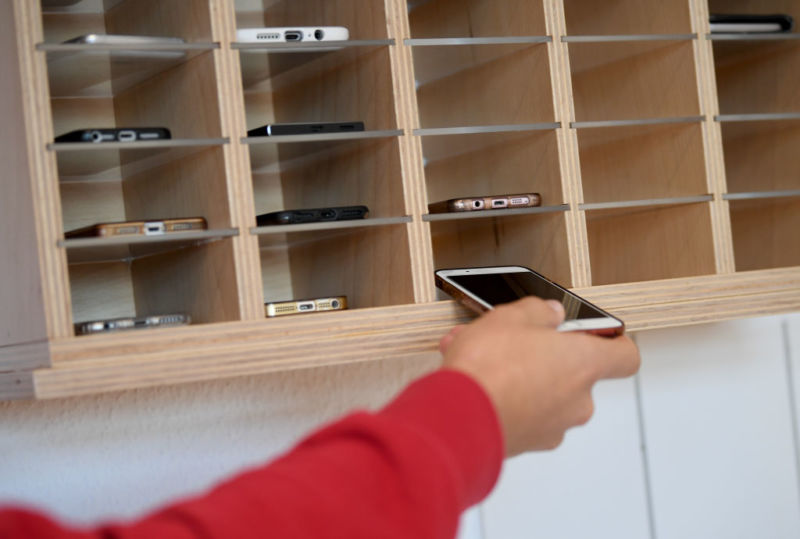
In the early 2000s, when I taught freshman writing at the University of North Carolina, disengaged students couldn't rely on the Internet to distract them—they had to make their own fun. One male student used a light "get to know each other" first-day exercise as a chance to tell the whole class an aggressive story about how he once peed in his much-despised stepfather's aftershave; another female student delivered a "professional presentation" to the whole class while wearing a sheer shirt and no undergarments. And you know what? I respected them both. That's the kind of old-school subversion of the classroom experience, the unspoken challenge to the authority of the teacher, that I can get behind. It takes creativity, it takes guts, it takes rebellion.
Today, who's got the energy for that kind of acting out? I've been in and around universities for my entire adult life, and in the last few years I've observed an astonishing "tuning out" taking place in the classroom. I've seen a student, in a course where cell phones and laptops were forbidden by the professor, slip his phone out of his pocket every two minutes, checking for messages and occasionally tapping out a quick reply under the table, apparently convinced that the professor did not notice this. (He did.) I've seen students shop for boots in class, log in to their stock market portfolios (!), read the newspaper, write emails, and even work on papers for other classes. One spent each class period scrolling through his Twitter account on a laptop, pausing to watch every moving GIF and video clip.
This is not just my experience. Take yesterday's piece in MIT Technology Review, where philosophy professor Ron Srigley writes about what cell phones have done to his own classroom. His conclusion is sobering: "I have a real fondness for my students as people. But they’re abysmal students; or rather, they aren’t really students at all, at least not in my class. On any given day, 70% of them are sitting before me shopping, texting, completing assignments, watching videos, or otherwise occupying themselves. Even the 'good' students do this. No one’s even trying to conceal the activity, the way students did before. This is just what they do."
Safe, secure, and distracted
After two mediocre classroom experiences—one in 2014 and one in 2018—Srigley suspected that online distractions were to blame. He gave his students a voluntary extra-credit assignment: ditch the cell phones and write about the experience.
A third of the students did so, and they wrote about how cell phones cut down on human interaction, saving people from having to navigate awkward interactions. Simply passing a stranger in the street or the hall caused "almost all of them to take out a phone 'right before I could gain eye contact with them,'" wrote one student. Others complained about friends who pulled out cell phones while talking to them. Still others wrote about how not using a phone freed them from the burden of responding to a long string of texts, social media posts, emails, and voicemails. "Didn’t have to hear the fucking thing ring or vibrate once, and didn’t feel bad not answering phone calls because there were none to ignore," wrote one student.
Not surprisingly, students also found that their ability to concentrate in class and while writing papers improved.
But students also reported a creeping sense of fear—what if I need my phone for an emergency? What if I need to contact someone right now? (This despite leading physically safe lives in a largely crime-free environment.)
The experiment was not rigorously controlled and may not be representative; by making it voluntary, those who felt the most dislike of their electronic tethers may have been the most likely to participate. Still, Srigley's informal experiment mirrors many of the findings of 2011's Alone Together, a book by MIT psychologist Sherry Turkle. After plenty of fieldwork and interviews, Turkle argued that too many of us are using technology in ways designed to kill solitude, relieve awkwardness, keep us feeling safe, and provide connection... on our terms.
But awkward interactions, calculated risks, time alone, and connecting with others without being in control of the interaction are all important parts of being human. Navigating those experiences is part of a healthy engagement with a world that we can never fully master, and the illusions of safety and control provided by our technology also produce isolation, distraction, and anxiety as we retreat from that uncontrollable world.
On the other hand, both Srigley and Turkle found that young people who are heavy smartphone users stay in near-constant communication with their parents, which was not true of previous generations. (Turkle argues that there is a dark side to this behavior, as younger people seem increasingly afraid to "cut the cord" and live on their own. As a parent myself, though, I take some comfort in the thought that my kids may actually want to text me while away at college.)
While the broader debate about screens, devices, and Internet usage continues to rage, what about this narrower question of how technology affects the classroom? It seems inarguable that widespread use of Internet-connected devices in the classroom has had a negative effect on student attention, but maybe I've just been in the wrong classrooms. And maybe, as some critics like to claim, it's old-school teaching models that need to change—and student disengagement is a symptom of boredom with lectures and discussions, not of a pathological distractedness. So what should the college classroom look like in the age of the smartphone?
reader comments
680